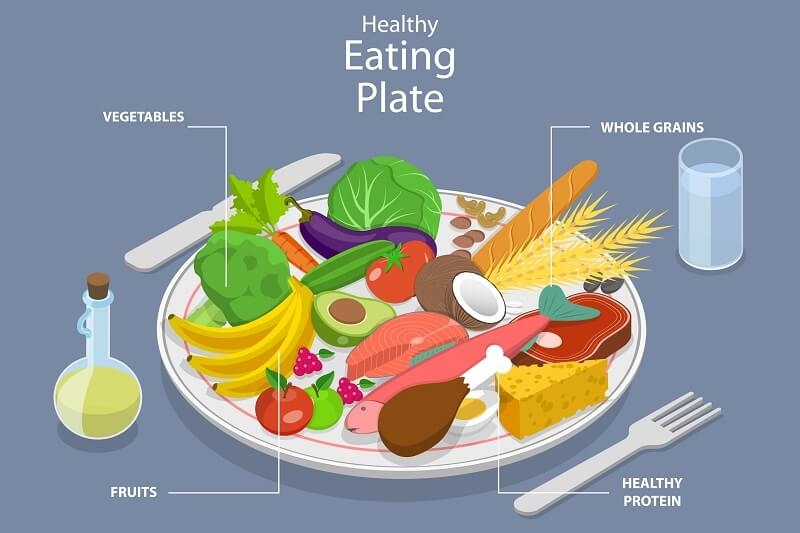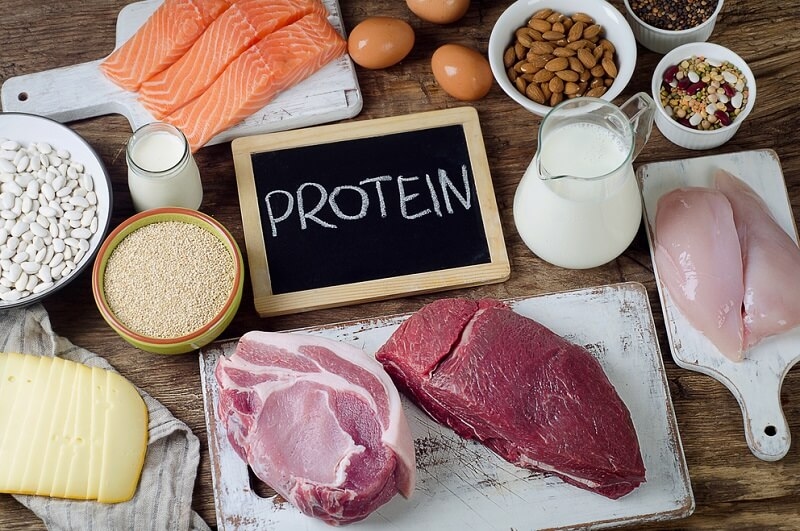Choosing The Perfect Food: How To Maintain A Balanced Diet

Maintaining a balanced diet needs to be noticed in our fast-paced world. A balanced diet is about controlling your weight and fueling your body with the nutrients it needs to function at its best. Understanding a balanced diet and the various food groups that should make up this vital aspect of our lives cannot be emphasized enough.
What is a Balanced Diet?
A balanced diet means consuming various foods in the right proportions to provide your body with all the essential nutrients for optimal function. Your body requires carbohydrates for energy, proteins for muscle repair, fats for vital functions, vitamins for various biochemical processes, and minerals for overall well-being. A balanced diet is not about eliminating but taking a brighter call to nourish your body effectively. A perfectly balanced diet can also ensure emotional wellness and mental health, alongside a healthy body.
Food Groups in Your Diet

For a healthy, balanced diet, prioritize fiber-rich starchy foods and incorporate dairy, including proteins, in your diet. It is also essential to opt for unsaturated oils. It spreads moderately, maintaining adequate hydration with at least 6 to 8 glasses of fluids daily and limiting high-fat, high-sugar, and high-salt foods and drinks. Choosing various foods from these groups is essential to ensure a broad spectrum of nutrients. Between 2 and 5 years old, children should gradually transition to consuming foods in proportions similar to those recommended in the guide.
What is the 5 A-day routine?
The famous "5 A Day" is a thoughtfully created routine focusing on eating at least five servings of fruits and vegetables daily. Vitamin C, found in citrus fruits and bell peppers, is crucial in immune health and wound healing. Vitamin A, abundant in carrots and spinach, supports vision and skin health. Bananas and sweet potatoes are full of potassium to help maintain healthy blood pressure levels. The dietary fiber in fruits and vegetables aids digestion and helps with weight management. A balanced diet ensures you get your daily dose of these essential nutrients.
Starchy Foods in Your Diet
Foods like bread, rice, pasta, and potatoes are rich in carbohydrates, the body's primary energy source. Carbohydrates are essential for providing fuel for daily activities and exercise. Whole grains, like brown rice and whole wheat bread, contain complex carbohydrates and fiber, which provide sustained energy and promote digestive health. They also contain vitamins and minerals, such as B vitamins and magnesium, vital for various metabolic processes. These types of food are the foundation of a balanced diet, giving you the energy required for long-term health. These foods, when consumed regularly, keep you away from vitamin supplements.
Milk and Dairy Foods
Calcium plays a role in muscle function and blood clotting. Dairy products are a protein and vitamin D source, which aids calcium absorption. Many dairy alternatives are available in cases of lactose intolerance, such as almond milk, soy yogurt, or fortified plant-based options. These alternatives provide similar nutritional benefits, ensuring a balanced diet is accessible to individuals with specific dietary preferences or restrictions. Whether you opt for regular dairy or other options, maintaining a balanced diet means prioritizing sources of calcium and protein to enhance your health.
Foods filled with Proteins

Proteins are the building blocks of life, and they maintain and repair tissues, producing enzymes and hormones and supporting immune function. A balanced diet incorporates a variety of protein sources to ensure you receive a wide range of amino acids and nutrients.
Fish
Fatty fish like salmon, mackerel, and trout are excellent protein sources and rich in omega-3 fatty acids. Omega-3 is linked to reduced risk factors for heart disease, including lower levels of triglycerides and improved heart rhythm. Including fish in your balanced diet is a smart choice for heart health.
Beans and Pulses
Plant-based protein sources are cost-effective and contain fiber, vitamins, and minerals. They are wealthy and healthy components in vegetarian or vegan diets. Lentils, chickpeas, black beans, and kidney beans can be incorporated into various dishes.
Eggs
They are often called a complete protein source because they contain all nine essential amino acids. They are also rich in choline, critical for brain health, and various vitamins and minerals, including vitamin B12 and selenium. Eggs are versatile in multiple culinary applications, making them valuable to a balanced diet.
Meat and Poultry
Lean meats and poultry, such as skinless chicken breast and lean cuts of beef, provide high-quality protein. They are also rich in heme iron, which is readily absorbed by the body and crucial for preventing iron-deficiency anemia.
Oils and Spreads
Oils and spreads are vital in flavoring your dishes and enhancing the absorption of fat-soluble vitamins (A, D, E, and K). However, not all fats are created equal, and a balanced diet focuses on incorporating healthy fats while limiting unhealthy saturated and trans fats.
Healthy Fats
Olive oil, avocado, nuts, and seeds are sources of healthy monounsaturated and polyunsaturated fats. These fats can help lower LDL cholesterol levels and reduce the risk of heart disease when used in moderation. Including these fats in your balanced diet can improve your meals' taste and nutritional profile.
Limit Saturated and Trans Fats
Saturated fats, primarily found in animal products and certain tropical oils like coconut and palm oil, can raise LDL cholesterol levels when consumed excessively. Trans fats, often found in processed and fried foods, are known to harm heart health. A balanced diet aims to minimize the consumption of these unhealthy fats.
Eat Less Saturated Fat, Sugar, and Salt

While a balanced diet emphasizes the inclusion of essential nutrients, it's equally important to limit certain elements that can negatively affect your health.
Saturated Fat
Saturated fats in fatty cuts of meat, full-fat dairy products, and certain processed foods can raise LDL cholesterol levels and increase the risk of heart disease. A balanced diet encourages moderation of saturated fats by choosing lean cuts of meat, opting for low-fat dairy or dairy alternatives, and reducing the intake of high-fat processed foods.
Sugar
Added sugars, commonly found in sugary beverages, candies, and processed snacks, can contribute to weight gain and increase the risk of conditions like type 2 diabetes and heart disease. A balanced diet advises reducing the consumption of foods and drinks high in added sugars and opting for whole fruits and foods with naturally occurring sugars when satisfying your sweet tooth.
Salt
High sodium intake, often associated with excessive salt, can raise blood pressure and increase the risk of hypertension and cardiovascular disease. A balanced diet promotes mindful salt intake by avoiding excessive use of table salt and being cautious of processed foods, which may contain hidden sources of sodium.
Conclusion
Maintaining a balanced diet is not a complex endeavor. It's about embracing variety, making informed choices, and nurturing your body with the required nutrients. By incorporating foods from all the essential food groups while keeping an eye on your consumption of saturated fats, sugar, and salt, you'll be well on your way to achieving and sustaining a balanced diet that supports your overall health and well-being. It's a lifestyle choice that can lead to a lifetime of well-being and vitality.
This content was created by AI
-1717753922-r.jpg)